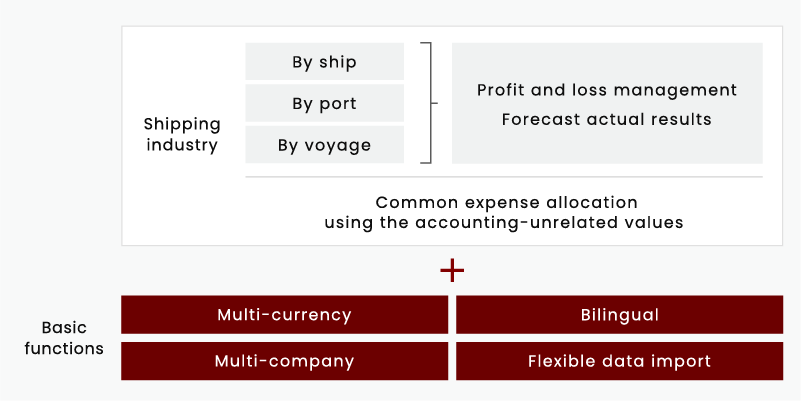Marine Transportation
System Best Suited for Shipping Industry that Needs Profitability Management by Vessel regardless of Your Own or Charter, including Foreign Currencies
Although Plaza-i is an ERP system, it allows simple implementation of only the accounting system on a standalone basis or making the most of elaborated management codes and features. As such, the range of implementation is all up to your needs. Embedded with the following standard features, Plaza-i is suitable for marine transportation business that needs profitability management by vessel.

Foreign Currency and English-Japanese Language Features
Plaza-i screens and reports can switch between English and Japanese with one click, which saves your time on creating English documents for non-Japanese ship owners, overseas officials, and parent companies. Foreign currencies are supported as standard and the following features necessary in the international ocean transport industry are available: automatic translation of foreign currency transactions based on forward exchange contracts, automatic journals, foreign currency balance management, and creation of financial statements in the home currency of overseas SPCs (Special Purpose Companies).
Managing Multiple SPCs
Since Plaza-i allows managing multiple companies, you can register and add as many SPCs as you wish for the purpose of owning ships. You just need only a few people to efficiently take care of accounting processes for multiple SPCs.

Analysis Management by Vessel by Shipping Lane
Profitability management is possible per group of vessel types. For example, put together Ship A and Ship B into a group of charter vessels and print income statements by combining the results of both ships. You can process management accounting, such as comparing profits made by vessel and by shipping lane and checking budget vs. actual. Furthermore, overhead allocation to each vessel is enabled based on accounting-unrelated values, such as the number of crew, working days, and cargo volume.
Documents and Financial Statements Unique to Ocean Transport
You can freely define ledger accounts and manage accounting figures in the account code structure that is appropriate for shipping industry.
You can also define financial statement formats suitable for the industry, for example, with shipping revenues/expenses and other revenues/expenses printed.
-
Related Pages
- International Trading
- Retail, Wholesale, Trading (Shosha)
- IT/Service
- Machine Sales and Maintenance
- Chemical Substance/Pharmaceutical Trading (Shosha)
- Imported Food/Import Companies (Shosha)
- Furniture and Interior Design Companies
- Multiple Locations/Warehouses
- Foreign Affiliated Companies
- Companies Expanding Overseas
- Client List
